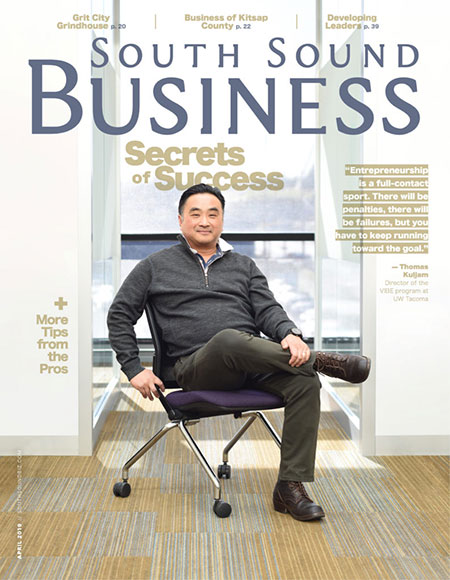Secrets of Success: Thomas Kuljam on Leadership
South Sound Business recently published a Q&A with Thomas Kuljam, director of UW Tacoma’s VIBE Business Incubator.

Premier Media’s South Sound Business magazine interviewed VIBE Director Thomas Kuljam as part of its April 2019 “Secrets of Success” cover story. Thirteen regional leaders, including Kuljam and Dr. Rachel Endo, Dean of the School of Education, offer tips on everything from the role of failure in the life of an entrepreneur to leadership inspired by social responsibility. Reprinted with permission.
Secrets of Success
By Joanna Kresge
In the Real World
Thomas Kuljam has worn many hats throughout his professional career. He has been a student, he has worked in the banking sector, he has done consulting work for Los Angeles County and the City of Tacoma, and he currently teaches entrepreneurship at the University of Washington Tacoma. But Kuljam’s first, and likely most prestigious, hat was the flight cap he wore at his Air Force Basic Military Training graduation ceremony in the late 1980s. What makes Kuljam such a successful teacher — his drill instructor-like penchant for kicking the classroom door open on the first day of class aside — is the real-world experience he has learned throughout his life, which he said he brings to every class. Kuljam sat down with South Sound Business to impart some of his practical wisdom on business, leadership, and failure.
Leadership
Q: You spent 20 years in the U.S. Air Force. What was the biggest take-away you have from that experience?
A: The aha moment for me was when I was TDY (temporary duty assignment) at Yokota Air Base in Japan … It was during an exercise at about 5 or 6 o’clock in the morning, when the sun starts coming up, and I start seeing tons of aircraft ready to launch. And all of a sudden, you’re like, “Holy (crap)! This … is real.” That real world sunk in because that aircraft in front of me was my responsibility. Meaning that if it breaks, I have to go up to the flight deck and say it’s not ready to fly, because pilots don’t know anything about that. Imagine, there you are, 19, almost 20 years old, and you have control of this weapons system.
Q: How do you take that experience and relate it back to your students when you are trying to teach them about the real business world?
A: I sit down, and I give them my real-world experience. And then, I would bring in a subject matter expert. That subject matter expert will come in — I don’t give them a script, but it’s the same message I’ve been telling (the class) only from a different perspective and voice, and they get it.
Q: You also run the Veterans Incubator for Better Entrepreneurship program at UWT. What is your No. 1 piece of advice to prospective entrepreneurs?
A: You don’t have a business until you have one thing: a customer. Everyone has all these great ideas, but it’s just an idea. To have a real business, you have to have your first paying customer. That’s a business. You also don’t have a business unless the cash flows. Cash is king.
Q: As someone who helps both veteran entrepreneurs and civilian entrepreneurs, would you say veterans have a little bit of a leg up, or would you say everyone is on a level playing field?
A: No way. The veterans have a leg up, by far. Based on Small Business Administration statistics, new businesses are more likely to start by veterans than any other demographic. It’s because of their ability to think outside the box, their ability to work long hours, their ability to work both as a team and independently, and their ability to be creative and innovative. And most importantly, it’s about learning how to work under ambiguity. The problem with the academic world is, there’s no ambiguity.
Q: What would you say to a business owner who is maybe hesitant to hire veterans?
A: Employers would do themselves a disservice by ignoring the large percentage of veterans out there. You know, veterans are very easy to train. If you just give them a mission and a purpose again, they’ll get the job done. And they don’t need guidance. Tell them you need increased sales by 10 percent, and they’ll go get it. Failure is not an option to them; they will find a way to be successful because if they have a sense of purpose, they will always succeed.
Q: What would you say to an entrepreneur — veteran or otherwise — that does go out into the real business world, and the business fails?
A: That’s part of the game because entrepreneurship is a full-contact sport. There’s going to be penalties, there’s going to be failures, but ultimately if you continue to (work at) the routines of life … it will happen. If you stop (trying), nothing is going to happen. Momentum creates opportunity. And failing? It’s great; you are going to learn from it. Failing at something is better than any lesson you are going to receive because if you are smart, you learn from your mistakes. Although, if you’re really smart, you’re going to learn from other people’s mistakes.
Recent news
Main Content
Educated Palate
Main Content
Lawless Honored with Governor’s Student Civic Leadership Award
Main Content
Towards the Functional Characterization of All Human Genes
UW Tacoma in the News
Main Content
Minnesota adoptees respond to fraud reports in South Korean adoption programs
Main Content
What’s next for The Swiss? Upcoming workshop to tackle how to best use iconic site
Main Content
Local Leaders Recognized at UW Tacoma’s Business Leadership Awards
Contact Information
- Phone: 253-692-5630
- Email: milgard@uw.edu
- Milgard School of Business (directory)



